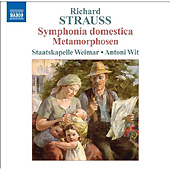
ESSENTIAL RECORDINGS

Here is that magical combination again. Put Antoni Wit, the Staatskapelle Weimar and Naxos together,
and for some reason you obtain a perfectly engineered recording with a realistic soundstage and true sonic impact. The Symphonia Domestica
composed by Richard Strauss in 1903, is scored for a very large orchestra and this recording takes it all in stride and copes with the
demands very easily. It is not a work as instantly gratifying as some of this composer's other tone-poems. After all, it's easy to impress when you
musically portray such things as mountains, heroic figures or the fate of mankind through deep philosophical musings. The Symphonia Domestica on the other hand deals with the trials and joys of the composer's own family life. Richard Strauss himself said: "I don't see why I shouldn't write a symphony about myself. I find myself just as interesting as Napoleon or Alexander." But don't be fooled or to quick to judge. Even though the subject matter may seem rather mundane compared to other Straussian undertakings, it is in this work that he really demonstrates both his writing and orchestration skills, and abundant they are. Various instruments and specific themes and motifs represent the father, mother, child and other family members engaging in daily activities and their feelings towards one another. It is divided into five movements that are played in one continuous line without breaks between them, and the thematic and motivic manipulations are so well written and conceived, that the whole 47 minutes feels like one completely worked-out idea from start to finish, and in true Straussian form is full of moments of wonderful orchestral writing
that will blow you away. His control of a symphony orchestra is second to none when it comes to form, context and mood. His tone-poems are like orchestral
dramatic operas.
On the other hand, Metamorphosen, written in 1945 when Richard Strauss was 80 and scored only for strings, is a work of profound grief,
lamenting the destruction of German culture during World War II. And again it is one solid continuous thread during its 28 minutes of duration, and in
its deep profundity and wisdom, reminds me very much of a late Beethoven string quartet by its flow and elemental coherence that comes so naturally to
composers that have mastered their art and honed their skills to unprecedented levels. Antoni Wit's reading of this late masterpiece captures the essence
of Strauss the man, and genius, very well.
As mentioned earlier, the sonic qualities of this recording are formidable. So much so, that if you listen to the Symphonia Domestica loud enough, the
impact of the last few minutes should have you grinning from ear to ear all day. Highly Recommended!
Jean-Yves Duperron